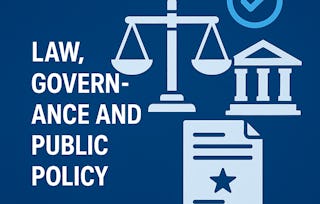"Be you so high, the law is above you." This principle, part of the Rule of Law, has come to represent the powerful idea that even politicians and monarchs are bound by the law. However in an age of powerful corporations, international cyber-crime and popular support for authoritarian leaders, the Rule of Law is under threat worldwide.

Citizenship and the Rule of Law
Ends tomorrow! Gain next-level skills with Coursera Plus for $199 (regularly $399). Save now.

Citizenship and the Rule of Law

Instructor: Michael Abiodun Olatokun
28,281 already enrolled
Included with
(536 reviews)
Recommended experience
What you'll learn
By the end of this course, you should be able to engage critically with the core requirements of the Rule of Law
By the end of this course, you should be able to explain why and how the Rule of Law is best protected
By the end of this course, you should be able to apply Rule of Law principles to issues in everyday life
By the end of this course, you should be able to construct and evaluate arguments about justice
Skills you'll gain
Details to know

Add to your LinkedIn profile
9 assignments
See how employees at top companies are mastering in-demand skills

There are 6 modules in this course
Welcome to the first week of the course. Week 1 is an overview of the headline debates concerning the Rule of Law and a discussion of how it applies in practice today. You will be taken through a historical account of the development of the principle over time from Aristotle’s first statement of the Rule of Law to the modern work of the Bingham Centre. This teaching session will also serve as an introduction to debates about the requirements of the Rule of Law, i.e. whether it passes judgment on if particular decisions are “good” or “bad” and whether human rights are part of the Rule of Law.
What's included
9 videos11 readings2 assignments2 discussion prompts
Welcome to the second week of the course. Week 2 will focus on processes for the selection and appointment of judges, the importance of public confidence in the judiciary and the role that judges play in securing the Rule of Law.
What's included
2 videos3 readings1 assignment
Welcome to the third week of the course. Week 3 will establish that all must be treated equally before the law. The session will discuss contentious situations in which treating people equally requires that they be treated differently in order to give effect to justice, such as the limited range of sanctions available to criminals convicted as children.
What's included
4 videos12 readings2 assignments1 discussion prompt
Welcome to the fourth week of the course. Week 4 looks at a number of other barriers that individuals face in enforcing their legal rights. One of the concepts explored will be ‘legal capability’. This is defined as the knowledge, skills and confidence required to resolve legal problems in life. Students will be presented with a range of initiatives undertaken by civil society to improve legal capability and will produce their own ideas about improving access to justice across the world.
What's included
5 videos6 readings1 assignment1 discussion prompt
Welcome to the fifth week of the course. Week 5 will introduce students to the international legal order and regional human rights conventions. The week will start with a potted summary of the development of the United Nations. The second portion of session will focus on human rights law. Course leads will discuss universal and regional human rights frameworks including the African Charter on Human and Peoples’ Rights, the American Convention on Human Rights and the European Convention on Human Rights and speak to examples of non-compliance in respect of each of these and how they are enforced. The course team would like to give special thanks to Hector Tejero Tobed and Iris Anastasiadou for their help in compiling video scripts and content for this week of the course.
What's included
4 videos9 readings2 assignments
Welcome to Week Six of the course. Week 6 delves into the Rule of Law questions raised by the potential impacts of business operations on the human rights of their employees, populations of countries they are based in and other community stakeholders. This week will provide a background and history of this new and dynamic area, and describe how all eight of Bingham’s Rule of Law Principles are engaged in this discussion. The session will consider how the three pillars of the UN Guiding Principles on Business and Human Rights are founded on basic principles of the Rule of Law. You will be presented with real-life current examples of how these principles apply in practices. Examples discussed will include: Recent case law which expands traditional legal tests to stay up to date with modern-day cross-border business operations; Calls for and against regulation of the internet, in light of increasing examples of harmful content, privacy breaches and other human rights impacts of tech giants; Discussion of how companies undertake due diligence for human rights in their global supply chains,Presentation of the challenges in this area from a Rule of Law perspective. Rule of Law principles such as access to remedies and legal certainty will be recurring themes. The session will also illustrate some “myth-busting” examples regarding assumptions about the Rule of Law's universality.
What's included
7 videos1 reading1 assignment1 discussion prompt
Instructor

Offered by
Explore more from Law
 Status: Preview
Status: PreviewUniversity of Geneva
 Status: Preview
Status: PreviewO.P. Jindal Global University
 Status: Preview
Status: PreviewErasmus University Rotterdam
 Status: Preview
Status: PreviewUniversity of Cambridge
Why people choose Coursera for their career

Felipe M.

Jennifer J.

Larry W.

Chaitanya A.
Learner reviews
- 5 stars
83.58%
- 4 stars
13.99%
- 3 stars
1.67%
- 2 stars
0.55%
- 1 star
0.18%
Showing 3 of 536
Reviewed on Dec 12, 2023
Really enjoyed this course. There is a lot of material and readings to do in order to go deeper in the proposed topics. Highly recommended.
Reviewed on Aug 4, 2020
This course was very interesting. It made me have a higher awareness of the value of human rights and the importance of the rule of law.
Reviewed on Jul 1, 2020
Must interesting subject I must gained extra knowledge. So that I should give five stars.
Frequently asked questions
The Bingham Centre’s website is located at binghamcentre.biicl.org.
The British Institute of International Law website can be found at biicl.org.
The Bingham Centre works to make the Rule of Law a practical and tangible entitlement of all across the world.
The Bingham Centre is active on social media at https://twitter.com/binghamcentre. Sign up for our newsletter too here: https://binghamcentre.biicl.org/enews-signup
More questions
Financial aid available,





